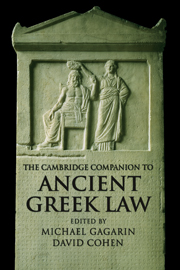Writing Greek Law
The use of writing in the development of Greek law was unique. In this comparative study Professor Gagarin shows the reader how Greek law developed and explains why it became so different from the legal systems with which most legal historians are familiar. While other early communities wrote codes of law for academic or propaganda purposes, the Greeks used writing extensively to make their laws available to a relatively large segment of the community. On the other hand, the Greeks made little use of writing in litigation whereas other cultures used it extensively in this area, often putting written documents at the heart of the judicial process. Greek law thereby avoided becoming excessively technical and never saw the development of a specialised legal profession. This book will be of interest to those with an interest in the history of law, as well as ancient historians.
- Was the first book to cover the whole of ancient Greek law in English
- Alternative approach to understanding the uniqueness of ancient Greek law
- Explains how law began and developed its unique nature in ancient Greece
Reviews & endorsements
Review of the hardback: '… brilliant analysis …' Edinburgh Law Review
Product details
June 2011Paperback
9780521297288
296 pages
229 × 152 × 16 mm
0.4kg
Available
Table of Contents
- Introduction: writing Greek law
- 1. Law before writing
- 2. Writing and written laws
- 3. Why the Greeks wrote laws
- 4. Why Draco wrote his homicide law
- 5. Oral and written in archaic Greek law
- 6. Writing laws in fifth-century Gortyn
- 7. Writing the Gortyn code
- 8. Writing law in classical Athens
- 9. Writing Athenian law: a comparative perspective
- 10. Writing law in Hellenistic Greece
- Conclusion: writing Greek law.








